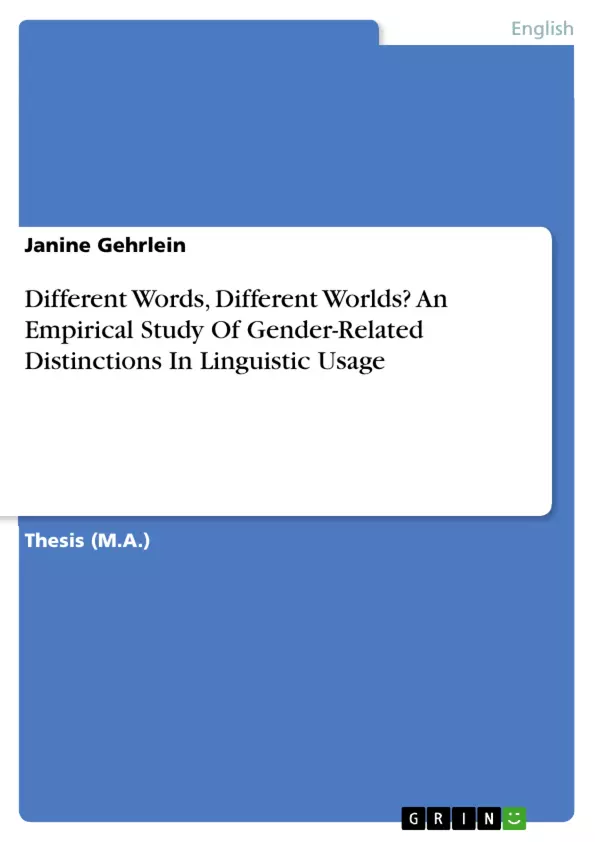The purpose of this thesis paper is to show and explain the differences in the usage of language between women and men and to clarify how far these differences have an impact on everyday life of the sexes. This paper consists of eight chapters and a conclusion, which is divided into two parts, one being theoretical; the other empirical.
Chapter 1 defines the difference between gender and sex and explains what is meant by the study of language and gender. Chapter 2 provides a short overview of the historical background of gender differences in language and is followed by Chapter 3, which will focus on the concept of language socialization. This chapter also deal with features that are typical for feminine and masculine speech as well as the position of women and men in society.
Chapter 4 points out the differences in the language of women and men as well as the features of cross-gender communication. Furthermore Chapter 4 will discuss the conversational goals that are set by female and male conversational partners. After this discussion, Chapter 5 will focus on the topics of politeness in same-gender and cross-gender communication. Chapter 6 examines the consequences of gender differences in language.
Chapter 7 and 8 will demonstrate an empirical part in which eight empirical studies on the usage of tag questions in female and male speech will be compared and discussed. By means of these empirical studies, the claims and statements about tag questions listed in the theoretical part will be supported and documented. To conclude, Chapter 9 will summarize the most important points of the thesis and alludes to future prospects for the study of language and gender.
Inhaltsverzeichnis (Table of Contents)
:- 0 Introduction
- 1 Gender and Sex
- 1.1 The difference between gender and sex
- 1.2 The study of language and gender
- 2 Historical Background
- 2.1 Folk linguistics
- 2.2 Dialectology and anthropology
- 2.3 The sociological aspect
- 2.4 The psychological aspect
- 3 Language Socialization
- 3.1 „Typically" feminine versus „typically" masculine language
- 3.2 Dominance - social position of men and women
- 4 Gender-Specific Communication
- 4.1 The language of women
- 4.2 The language of men
- 4.3 Cross-gender communication
- 4.4 Conversational goals
- 5 Politeness in Same-Gender and Cross-Gender Communication
- 5.1 Solidarity
- 5.2 Turn-taking
- 5.3 Body language
- 5.4 Apologies
- 5.5 Compliments
- 6 Consequences of Gender Differences in Language
- 6.1 The acquisition of a gender-differentiated language
- 6.1.1 The development of a gender-appropriate speech
- 6.1.2 Language differences due to the linguistic environment
- 6.2 Misunderstandings
- 6.2.1 Independence versus connection and intimacy
- 6.2.2 Orders
- 6.2.3 Giving advice
- 6.2.4 Silence
- 6.2.5 The interpretation of minimal responses
- 6.1 The acquisition of a gender-differentiated language
- 7 Objects of Investigation, Methods and Results
- 8 Discussion
Zielsetzung und Themenschwerpunkte (Objectives and Key Themes)
: This thesis aims to demonstrate and explain the differences in the usage of language between women and men and clarify how far these differences have an impact on everyday life.- Gender and sex distinctions
- Historical background of gender differences in language
- Language socialization and gender-specific communication
- Politeness strategies in same-gender and cross-gender communication
- Consequences of gender differences in language
Zusammenfassung der Kapitel (Chapter Summaries)
: The introduction outlines the purpose and structure of the thesis, emphasizing the need to study gender-related differences in language usage and their real-world impact. Chapter 1 defines the difference between gender and sex and explains the study of language and gender. Chapter 2 provides a brief overview of the historical background of gender differences in language, including folk linguistics, dialectology, anthropology, sociological and psychological aspects. Chapter 3 focuses on language socialization, outlining the process of learning gender-appropriate language and behavior, and explores the features of “typically” feminine and masculine language. Chapter 4 discusses differences in the language of women and men, as well as the features of cross-gender communication, examining conversational goals set by each gender. Chapter 5 delves into politeness in same-gender and cross-gender communication, comparing the ways men and women show solidarity, handle turn-taking, use body language, apologize, and give compliments. Chapter 6 explores the consequences of gender differences in language, including the acquisition of a gender-differentiated language and the misunderstandings that can arise from these differences.Schlüsselwörter (Keywords)
: The primary focus of this thesis is on gender-related distinctions in linguistic usage. Key areas of investigation include language socialization, gender-specific communication, politeness strategies, and the consequences of gender differences in language for everyday life. The thesis also examines specific linguistic features like tag questions, interruptions, minimal responses, and the use of compliments.Frequently Asked Questions
What is the difference between gender and sex in linguistic studies?
The thesis defines sex as biological and gender as a social construct, explaining how both influence the study of language.
How does language socialization affect speech patterns?
It is the process by which individuals learn "typically" feminine or masculine language based on their societal position and environment.
What are tag questions and how do they differ by gender?
Tag questions are short additions to sentences (e.g., "isn't it?"). The empirical part of the thesis compares their usage frequency between men and women.
What causes misunderstandings in cross-gender communication?
Differences in conversational goals, such as independence versus connection/intimacy, and the interpretation of minimal responses or silence.
Are there gender differences in politeness strategies?
Yes, the study examines differences in turn-taking, body language, apologies, and the giving of compliments between genders.
- Citation du texte
- Janine Gehrlein (Auteur), 2009, Different Words, Different Worlds? An Empirical Study Of Gender-Related Distinctions In Linguistic Usage, Munich, GRIN Verlag, https://www.grin.com/document/150814



